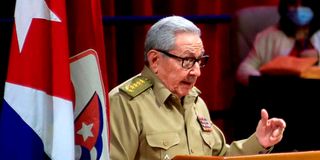A future without Castro: leadership change in Cuba

People gather before the start of the last ceremony to pay homage to the late Cuban leader Fidel Castro in Santiago, Cuba on December 3, 2016.
What you need to know:
- Before Raul Castro, Fidel ruled Cuba for nearly half a century from 1959 to 2006, when he fell ill. Fidel is still widely revered as the country's father and savior.
Havana,
The Communist Party of Cuba (PCC) opened an historic four-day congress Friday to rubber-stamp the transfer of power to a younger generation after six decades in the hands of the brothers Castro.
The reins will pass from Raul Castro, 89, to Miguel Diaz-Canel, who has already served as Cuba's president since 2018, when Castro relinquished that part of his executive portfolio.
In addition to the presidency, 60-year-old Diaz-Canel will now also hold the country's most powerful position -- that of first secretary of the PCC, a post previously only held by Castro and his brother, revolutionary leader Fidel, who died in 2016.
In a tweet Friday, Diaz-Canel said the congress would be a forum where "ideas are entrenched, history recognized and the future discussed."
But he underlined there would be "continuity" as one of the world's last five communist nations tackles the future.
Before Raul Castro, Fidel ruled Cuba for nearly half a century from 1959 to 2006, when he fell ill. Fidel is still widely revered as the country's father and savior.
Diaz-Canel becomes Cuba's first civilian leader since the Castro-led revolution of the 1950s, which happened before he was even born.
But while the suit-and-tie wearing, tech-savvy Beatles fan may be more modern in some ways than his predecessors -- both of whom were fond of donning military garb -- he remains first and foremost a party disciple, and observers do not expect radical policy changes.
"The absence of a Castro at the helm doesn't necessarily mean there's going to be an abrupt change in the Communist party's style," said Norman McKay, an analyst with The Economist Intelligence Unit.
A new constitution passed in May 2019 made it clear that the country's commitment to socialism was "irrevocable."

Raul Castro speaks during the opening session of the 8th Congress of the Cuban Communist Party at the Convention Palace in Havana, on April 16, 2021, in this picture released by Cuban News Agency (ACN).
Pressing matters
Many Cubans pay little heed to politics, preoccupied as they are by the worst economic crisis in 30 years, sky-high inflation, biting food shortages, long lines for basic necessities and limited freedoms.
Cuba's economic crisis is caused in part by its own management failures, worsened by US sanctions ramped up under Donald Trump and the coronavirus pandemic, which dried up tourists -- a key income source for the island.
The economy plummeted by 11 percent in 2020, the worst decline since 1993 in the country of 11.2 million.
Economic reforms to phase out the US dollar-pinned "convertible" peso -- leaving only the less valuable official peso in place -- saw salaries increased by the state, but not enough to make up for the resulting price inflation.
Many stores now accept only US dollars -- these are better stocked than others -- but few people can afford to frequent them.
The PCC has said its congress would "review core issues of the political, economic and social life of the country."
The four-day congress opened behind closed doors Friday with hundreds of delegates from all over the island, 60 years after Fidel Castro officially declared Cuba's government a socialist one, setting off decades of conflict with the United States.

A handout picture taken from Cuban website www.cubadebate.cu shows Cuban President Miguel Diaz-Canel applauding during the opening session of the 8th Congress of the Cuban Communist Party at the Convention Palace in Havana, on April 16, 2021.
More rights
In 2021, there are some signs that Cuba's leadership will have little choice but to increasingly balance the interests of the old guard with a clamor for more rights and better quality of life from younger generations.
In February, it opened the bulk of its government-monopolized economy to entrepreneurs in the private sector.
There have also been small nods to social liberalization by Havana, under sanctions from the United States since 1962.
In recent months, the government held its first-ever talks -- though short-lived -- with pro-free speech protesters, after authorizing in 2019 Cuba's first non-political demonstration, by animal rights activists.
The arrival of the internet on mobile phones at the end of 2018 has made for a paradigm shift in Cuba, with never-before-seen access to information and new forums for expression, even protest.
In response, the PCC has said its congress would be "confronting political and ideological subversion, which has made internet and social media its principal field of operations."
Control over information has always been a key tool of PCC rule.
The official hand-over of power is expected next Monday.





